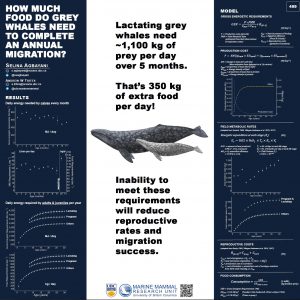Alumni
Tel: 604.822.8181
Fax: 604.822.8180
E-mail: s.agbayani@oceans.ubc.ca
Supervisor: Dr. Andrew Trites
Education: BSc. Forest Sciences, Adv. Dipl. GIS
Research Interests: cetaceans, marine mammals, marine megafauna, foraging ecology, bioenergetics, conservation, cumulative effects, climate change
Research Area: Eastern Pacific
Bioenergetic requirements of grey whales in the face of prey shortages
Problem
Eastern North Pacific grey whales (Eschrichtius robustus) rely heavily on energy reserves obtained on their northern feeding grounds to complete their annual 17,000 km round trip between the Arctic and Mexico. Unusually high mortalities of grey whales observed in 1999 and 2000 during their northward migration were attributed to starvation caused by reduced prey availability (likely due to climate change) or competition from increased numbers of whales on the feeding grounds. However, the role that decreased prey intake had on the observed mortalities cannot be evaluated without knowing the minimum amounts of prey required to sustain the annual migration. We addressed this knowledge gap by constructing an age-structured bioenergetics model to predict the energy requirements of each migrating cohort of grey whales and estimated the minimum threshold of daily prey consumption needed during the summer to avoid nutritional stress during the annual migration. Inputs included a comprehensive growth model describing mass-at-age for females and males, and refined estimates of energetic expenditure for different activity states based on field measurements of respiration rates at each life stage or reproductive state. Our model thereby derived daily food requirements (e.g., kg of amphipods, mysid shrimp, etc.) for all age classes of grey whales and also incorporated a range of annual energetic requirement thresholds that has specific life history consequences. Thus, we related death and reproductive failure to the amounts of prey consumed (i.e., expressed as a proportion of daily energy requirements met) to predict future mortality rates of grey whales as a function of varying prey densities. Our results, when combined with measured densities of benthic prey, can be used to assess and anticipate the likelihood of starvation-related mortality events occurring, due to either population or environmental changes.
Click here to view my poster from WMMC 2019:
Publications
Agbayani, S, SME Fortune, AW Trites. Growth and development of North Pacific grey whales (Eschrichtius robustus). Submitted to Journal of Mammalogy (JMAMM-2019-086).
Agbayani, S, Picco CM and HM Alidina. 2015. Cumulative impact of bottom fisheries on benthic habitats: a quantitative spatial assessment in British Columbia, Canada. Ocean and Coastal Management 116:423-434.
Clarke Murray C, S Agbayani, N Ban. 2015a. Cumulative effects of planned industrial development and climate change on marine ecosystems. Global Ecology and Conservation 4:110-116.
Clarke Murray C, S Agbayani, N Ban, HM Alidina. 2015b. Advancing marine cumulative effects mapping: An update in Canada’s Pacific waters. Marine Policy 58:71-77.
Ewins, PJ, KA McDonald, & S Agbayani. 2014. The WWF Species Action Plan for Arctic Whales, 2014-2020. WWF Global Arctic Programme, Ottawa, Canada.
Okey, TA, HM Alidina, S Agbayani. 2015. Mapping ecological vulnerability to climate change in Canada’s Pacific marine ecosystems. Ocean and Coastal Management 106:35-38.
Reeves RR, PJ Ewins, S Agbayani, MP Heide-Jørgensen, KM Kovacs, C Lydersen, R Suydam, W Elliott, G Polet, Y van Dijk, R Blijleven. 2014. Distribution of endemic cetaceans in relation to hydrocarbon development and commercial shipping in a warming Arctic. Marine Policy 44:375-389.
WWF Global Arctic Programme. 2012. Important Marine Areas in the Arctic. [Atlas] Maps created by S Agbayani.

